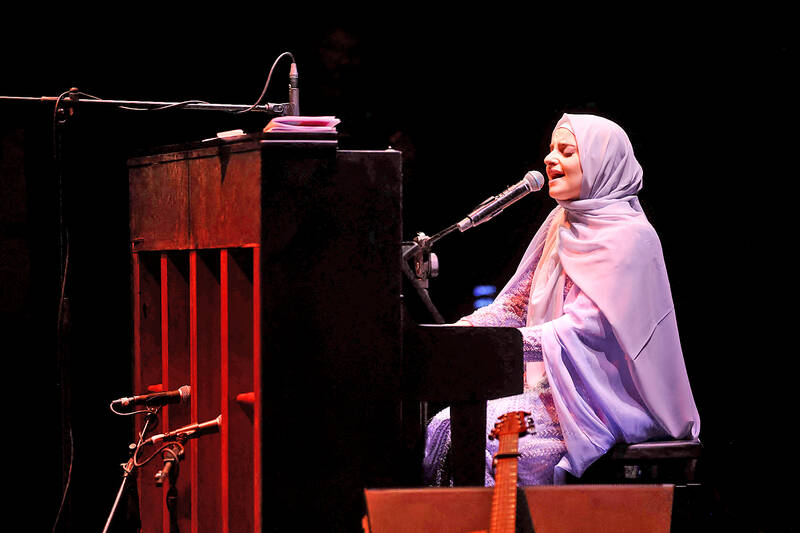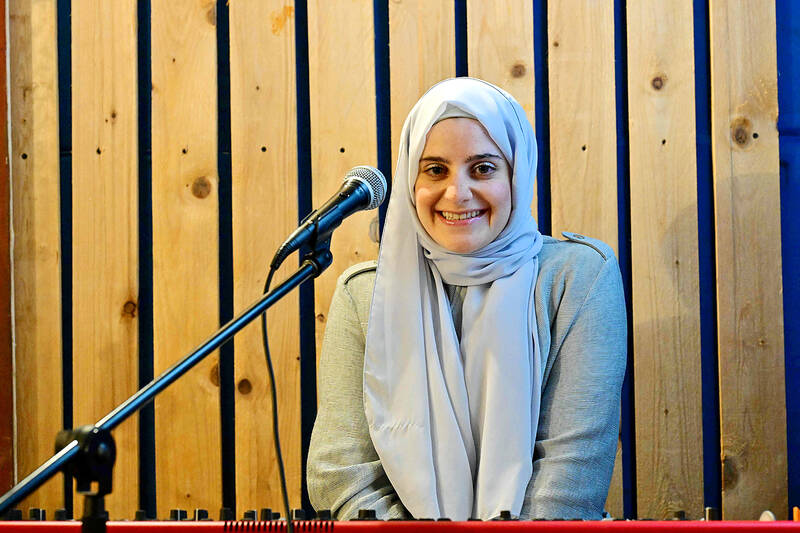In a Dubai recording studio, hijab-clad Ghaliaa Chaker tuned her guitar and belted out original songs as she builds a career that is turning heads for more than just her music.
The 26-year-old Syrian, who was raised in the United Arab Emirates (UAE), has become a social media sensation, with 437,000 followers on Instagram and millions of views on her YouTube channel.
She offers not only a unique sound, but also an unusual look in a region where artists who wear the hijab are few and far between.

Photo: AFP
“I hope that I have paved the way for other” hijabi singers, Chaker said at the studio. “It is a very beautiful thing to know that you have ... given a push to a girl who has many dreams and is unable to achieve them because she has never seen another girl do the same thing.”
Chaker, a keen motorbike rider who is part of an all-hijabi biker squad in Dubai, began composing and writing lyrics at the age of 16.
She drew inspiration from Nedaa Shrara, a veiled Jordanian singer who won the Arabic version of The Voice in 2015.

Photo: AFP
Shrara had stirred controversy among some Arab fans who were not accustomed to seeing a singer wearing the head covering.
For Chaker, who said she often receives criticism online, Shrara was a symbol of “self-confidence.”
After seeing her, “I said to myself that I can do it too,” Chaker said.
Chaker’s first song, composed in English, was picked up by Dubai radio stations in 2018, marking the start of her musical career.
She now sings mostly in Arabic, as young talents with innovative sounds are rising in the regional music scene.
The green-eyed singer said the headscarf had never been an obstacle in her life.
“There is nothing that I have wanted to do and not done because I wear the veil,” Chaker said.
However, the issue of women singing has always been controversial in conservative Islamic societies.
Although the Koran does not explicitly prohibit singing, or ban women from performing music, some religious academics frown upon the idea, viewing it as immodest.
Chaker said her immediate family has always supported her, but relatives in Syria were “very surprised at first,” mainly because they feared how people would react.
She said she receives a lot of “negative comments” on social media, including from family and friends.
“It bothers me of course, but I try to remember the positive comments and how much people love my music,” she said.
Chaker traces her artistic influences to her early upbringing in Al Ain, a former desert oasis and now a city in Abu Dhabi, one of the UAE’s seven sheikhdoms.
At home, her father blasted Arab singers such as Fairouz, an iconic Lebanese singer, and Egyptian diva Umm Kalthoum, while Chaker’s mother preferred Western music including Elvis Presley, she said.
“The music mixture in the house was always rich,” she said, influencing her sound which she describes as a mix of R&B, hip hop, electro pop, indie and jazz.
A multi-instrumentalist, Chaker credits her father with her love of the drums, guitar and piano, all instruments that she plays.
Instead of gifting her toys as a child, he would buy her new instruments, she said.
The Middle Eastern darbuka drum is “the closest to my heart because I often played it with my father who loves it very much and it is the basis of oriental rhythm,” she said.
The singer, who performed in the Lebanese capital, Beirut, last month, said she wants to take her music beyond the Middle East.
“It is very important to me that my music is heard in Europe, in America, in Australia, in the whole world, maybe even in Latin America,” she said, adding that she aspires to “collaborate with many artists from different countries.”
“It is time for the Western world to know how beautiful our music is,” she said.

The death of a former head of China’s one-child policy has been met not by tributes, but by castigation of the abandoned policy on social media this week. State media praised Peng Peiyun (彭珮雲), former head of China’s National Family Planning Commission from 1988 to 1998, as “an outstanding leader” in her work related to women and children. The reaction on Chinese social media to Peng’s death in Beijing on Sunday, just shy of her 96th birthday, was less positive. “Those children who were lost, naked, are waiting for you over there” in the afterlife, one person posted on China’s Sina Weibo platform. China’s

‘NO COUNTRY BUMPKIN’: The judge rejected arguments that former prime minister Najib Razak was an unwitting victim, saying Najib took steps to protect his position Imprisoned former Malaysian prime minister Najib Razak was yesterday convicted, following a corruption trial tied to multibillion-dollar looting of the 1Malaysia Development Berhad (1MDB) state investment fund. The nation’s high court found Najib, 72, guilty on four counts of abuse of power and 21 charges of money laundering related to more than US$700 million channeled into his personal bank accounts from the 1MDB fund. Najib denied any wrongdoing, and maintained the funds were a political donation from Saudi Arabia and that he had been misled by rogue financiers led by businessman Low Taek Jho. Low, thought to be the scandal’s mastermind, remains

‘POLITICAL LOYALTY’: The move breaks with decades of precedent among US administrations, which have tended to leave career ambassadors in their posts US President Donald Trump’s administration has ordered dozens of US ambassadors to step down, people familiar with the matter said, a precedent-breaking recall that would leave embassies abroad without US Senate-confirmed leadership. The envoys, career diplomats who were almost all named to their jobs under former US president Joe Biden, were told over the phone in the past few days they needed to depart in the next few weeks, the people said. They would not be fired, but finding new roles would be a challenge given that many are far along in their careers and opportunities for senior diplomats can

Australian Prime Minister Anthony Albanese yesterday announced plans for a national bravery award to recognize civilians and first responders who confronted “the worst of evil” during an anti-Semitic terror attack that left 15 dead and has cast a heavy shadow over the nation’s holiday season. Albanese said he plans to establish a special honors system for those who placed themselves in harm’s way to help during the attack on a beachside Hanukkah celebration, like Ahmed al-Ahmed, a Syrian-Australian Muslim who disarmed one of the assailants before being wounded himself. Sajid Akram, who was killed by police during the Dec. 14 attack, and